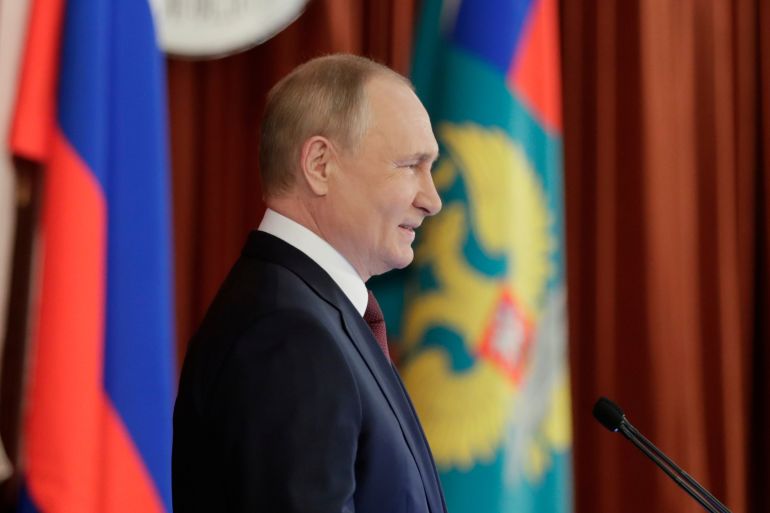Putin accuses the West of taking Russia’s ‘red lines’ too lightly
Russian president says Moscow needs serious security guarantees from the West, accuses NATO of destroying all mechanisms for dialogue.

President Vladimir Putin has said the West is taking Russia’s warnings not to cross its “red lines” too lightly and accused NATO of destroying all mechanisms for dialogue with Moscow.
In a wide-ranging televised foreign policy speech on Thursday, Putin also described relations with the United States as “unsatisfactory” but said Russia remained open to talks with Washington.
Keep reading
list of 4 itemsWhy has Germany halted Nord Stream 2?
What’s Putin’s gain in the Belarus migrant crisis?
Russia has 90,000 troops near Ukraine border, Kyiv says
The Kremlin said in September that NATO, the US-headed transatlantic security alliance with which Moscow severed ties last month, would overstep a Russian red line if it expanded its military infrastructure in neighbouring Ukraine.
Moscow has since accused Kyiv and NATO – of which Ukraine is an ally but not a member – of destabilising behaviour, including in the Black Sea.
Putin said Western strategic bombers carrying “very serious weapons” were flying within 20 kilometres (12.5 miles) of Russia’s borders.
“We’re constantly voicing our concerns about this, talking about red lines, but we understand our partners – how shall I put it mildly – have a very superficial attitude to all our warnings and talk of red lines,” he said.
Growing tension over Ukraine
Putin said Russia needed to seek long-term guarantees of its security from the West, though he said this would be difficult and did not spell out what form the assurances should take.
Russia-West ties have been at post-Cold War lows since 2014, when Moscow annexed the Crimean peninsula and a war broke out between Ukrainian troops and Russian-backed separatist forces in eastern Ukraine.
But the tone has sharpened in recent weeks as Kyiv and NATO member states have raised fears over renewed Russian troop movements near its frontier with Ukraine after Moscow conducted war games in the region earlier this year.
Ukraine’s defence ministry said in early November that about 90,000 Russian troops were stationed near the border.
Despite the growing tension, however, the Kremlin has maintained high-level contacts with Washington and spoken repeatedly of a possible summit between Putin and US President Joe Biden to follow up their initial meeting in Geneva in June, which Putin said had opened up room for an improvement in ties.
Russian Security Council Secretary Nikolai Patrushev and US National Security Adviser Jake Sullivan discussed cybersecurity, Ukraine and the migration crisis on the Belarus border in a phone call on Wednesday, the Kremlin said.
“This was all in the framework of preparation for … high-level contact,” Kremlin spokesman Dmitry Peskov said.